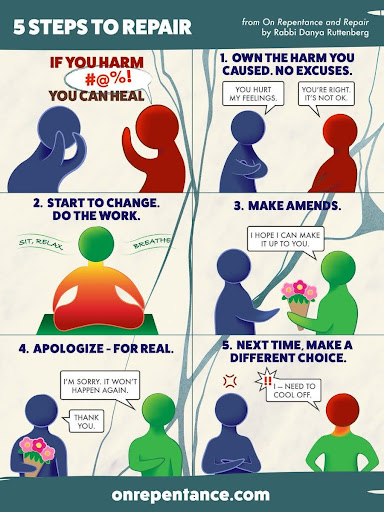Dear Congregation Beth Israel members and friends,
One of my favorite things that I’m doing right now is co-teaching a class called “Repentance and Repair” with Rabbi David Markus. As some of you know, we started off by assigning a little bit of spiritual homework.
First we asked everyone to (privately, internally) identify a few mis-steps from the last year. Then we invited the group to reflect on a chart of character qualities (arising out of Mussar, Jewish spiritual self-improvement work) and identify a few that we each need to strengthen based on the places where we missed the mark. And then we asked folks to post reminders of those qualities in places where they’ll see them: post-it notes on the bathroom mirror? Alerts on one’s phone? Wherever the reminders will reach you. (I’ve got one stuck with a magnet to my fridge so I see it every time I walk into the kitchen.)
It’s easy to fall into the habit of seeing teshuvah (repentance / repair / return) as being about our shortcomings. But it is equally true that teshuvah is about the joyous practice of trying to be the best that we can be. That periodic table of character qualities is a list of awesome things. When we fall short of our ideals, it’s not because we are terrible human beings. We just need to strengthen certain emotional and spiritual muscles.
 One of the things I love about Rabbi Danya Ruttenberg’s book On Repentance and Repair, and about the teachings from Maimonides at its heart, is the five-step rubric for making teshuvah. Step one: own the harm. Name the thing we did wrong. Admit it to ourselves. Call it what it is. Step two: start to change. Do the inner work of figuring out why and how we messed up. What activated us? How can we avoid that happening again? What character qualities do we need to strengthen? Step three: make amends. Make restitution. Make it right however we can.
One of the things I love about Rabbi Danya Ruttenberg’s book On Repentance and Repair, and about the teachings from Maimonides at its heart, is the five-step rubric for making teshuvah. Step one: own the harm. Name the thing we did wrong. Admit it to ourselves. Call it what it is. Step two: start to change. Do the inner work of figuring out why and how we messed up. What activated us? How can we avoid that happening again? What character qualities do we need to strengthen? Step three: make amends. Make restitution. Make it right however we can.
Step four: apologize. It goes without saying that this needs to be a real apology; not “I’m sorry if you were upset” or deflecting blame, but genuinely taking responsibility. And step five: when the opportunity to mess up comes around again (which it always will!), make a different choice.
Is anyone surprised that apologizing doesn’t come until step four? This is one of the things I think is most brilliant about this system. In order for an apology to be real, it needs to have action behind it. If we’ve already started doing the inner work to figure out why we erred and how to do better – if we’ve already done what we could to make the person “whole,” to repair what we broke, to make restitution in whatever ways we can – then the apology is likelier to be both real and transformative, for us and for the person to whom we’re apologizing.
Even if you’re not taking the class, this work can still be part of your September. This opportunity is open to all of us as part of Jewish spiritual practice as we prepare for the High Holidays.
Tradition teaches that for mis-steps between us and God* (*whatever that word means to you – God far above or deep within, Meaning, the Sacred, Love, Justice, Truth) Yom Kippur atones: on that sacred day we can wipe the spiritual slate clean and begin again. But for mis-steps between us and each other, Yom Kippur isn’t a magic fix-it button. We need to make an effort to repair those broken places ourselves.
Some of us may have grown up with the teaching that the Ten Days of Teshuvah (the days between Rosh Hashanah and Yom Kippur) are the time of year for that kind of repair. And sure, those days are great! But why wait until the new year to begin living up to our ideals?
5784 has been a difficult year for Jewish communities everywhere. In just a few short weeks we’ll come together for the holiest season in the Jewish year. This is a time in our year when we’re encouraged to keep our hearts and souls tender and open. What better time to do the teshuvah work that’s always at hand? So I invite all of us to take a look at that chart of character qualities and pick a couple of words that make you think, “wow, I wish that described me.” And then live into that, and start making it true.
I can’t wait to ring in the new Jewish year with all of you.
Blessings to all,
— Rabbi Rachel





